Wakiso District is a rapidly expanding urban area outside Uganda’s bustling capital city, Kampala. In recent years, it has suffered from many of the problems which can occur when infrastructure needs fail to keep pace with population growth, such as poor sanitation and overcrowding. In the past, the local council has lacked the capacity to manage these growing demands. However, over time the four features of the CoST approach – disclosure, assurance, multi-stakeholder working and social accountability – have helped to transform infrastructure delivery in Wakiso District. As explored below, social accountability has been particularly important throughout this process.
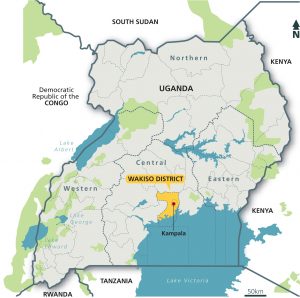
The social accountability feature recognises the crucial role that the public, media and civil society play in holding decision-makers to account. Facilitating discussion around infrastructure is a key means by which the public becomes engaged in the process, ensuring key issues such as project commencement, cost and quality remain in the public sphere. In Wakiso District, CoST Uganda deployed a traditional approach to social accountability by using ‘barazas’ to build citizenship engagement and trust in the region.
Barazas
Barazas are community engagement meetings which take place throughout Uganda. They provide a platform for citizens to voice concerns to decision-makers about publicly funded works – in this case, infrastructure projects – which affect them. By encouraging knowledge sharing between stakeholders, barazas not only keep the community abreast of developments but also provide an opportunity for officials to tap into invaluable local knowledge.
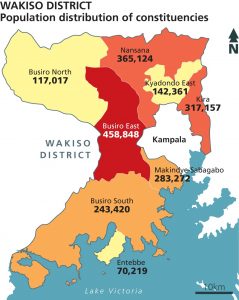 Building relationships through social accountability: How the baraza story began
Building relationships through social accountability: How the baraza story began
When Uganda joined CoST in 2014, public infrastructure management was typified by a lack of oversight and transparency, of which Wakiso District was no exception. In 2015, Wakiso District Council developed a Strategic Road Plan to address some of the area’s transport and accessibility issues, which included building new, tarmacked roads. For this, the council would need to build over community land. However, with poor relations between the community and local government, district officials knew it was unlikely for the public to allow their land to be acquisitioned.
What was the solution?
Wakiso Council approached residents directly, who explained why they were reluctant to move ahead with this part of the Strategic Road Plan. Some were concerned about land compensation and poor service delivery: others had never seen tarmacked roads before, so were unconvinced of their necessity in the first place. Wakiso District Council took the step of going back to the community and explaining exactly what the Strategic Road Plan was. A clear explanation alleviated many of the resident’s concerns and gave them the opportunity to ask further questions. As a result of this, they agreed for their land to be used.
From here onwards, the council knew that community participation would play a key role in the success of future infrastructure works. However, the council was unsure how start building community ties. In an interview with CoST, Wakiso District Engineer, Samuel Mwesigwa explains the advice given by the CoST Uganda team:
‘’When CoST came to us, they told us what information was needed to inform the community and avoid resentment…We needed to explain what kind of problems there would be (like dust and disruption), the timeframe and how much it would cost. CoST brought us on board and explained how we could improve our accountability.’’
One method recommended by CoST was to start holding barazas, which would serve as a platform to communicate with residents. The first baraza was held in December 2017 and these events have since become a clear example of how social accountability can empower citizens to both question and guide the actions of officials.
What impact has this had?
By engaging with the local community, the relationship between citizens and Wakiso District Council has transformed. Barazas have given the residents the information they need to trust the council in the work they’re doing, and in return they provide engineers with crucial information about the local area which informs infrastructure delivery. According to Wakiso District Engineer, Samuel Mwesigwa:
‘’Since following CoST principles, the community has told us so much that we didn’t know, such as local flooding patterns… Barazas can be challenging, as you don’t know what will be thrown at you. But now we know that we will lose nothing by being transparent.”
Community voices transform safety along Namasuba – Ndejje – Kitiiko Road
The CoST assurance process furthers accountability – it is an independent review of the disclosed data, carried out by assurance teams appointed by CoST national programmes. The teams identify key issues of concern and put technical jargon into plain language. This allows stakeholders to easily understand the issues and hold decision makers to account.
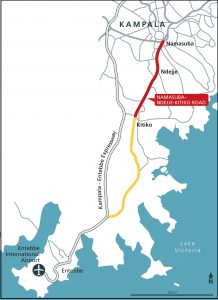
The Namasuba – Ndejje – Kitiiko Road repair project has been included in CoST Uganda’s first and second assurance processes. It is a major road which connects Makindye-Sagabago with the city of Kampala and the Entebbe Highway. A repair project on the road has been underway since December 2015, to relieve traffic on the Entebbe Highway and improve access and transport routes for the communities the road passes through.
The project has been implemented in phases, beginning with 10km of resurfacing – nearly the entirety of the road. This newly built, concrete stretch was the first of its kind that many local residents had seen or used. The road also runs through a residential area which is home to Kampala business-men and women, members of civil society, law makers and government workers. It is lined with schools, businesses, food vendors, petrol stations and homes.
What was the problem?
Over time, critical concerns about the project came to light. Sections of the road repair had been abandoned and drainage trenches which had been dug along it were blocking access to homes and shops. Some sections of the road passed through a swamp, which flooded every rainy season and became hazardous to people travelling along it. Most worrying was the fact that five deaths had been caused by speeding vehicles in the three months since the road had been tarmacked.
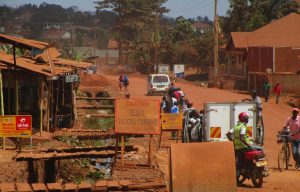
To encourage the community to raise concerns about the project, CoST Uganda partnered with local authorities to organise a baraza, which was held in December 2017. Residents complained that the road was dangerous and requested speed bumps be built. In a survey conducted by CoST Uganda, one resident complained that the road had been so dangerous that families could no longer allow their children to cross the road to go to school or the shops.
Following the baraza, speed bumps were erected in February 2018. The roadworks through the swamp were fast tracked and culverts have been built which manage the flooding. This is now a paved road with drainage either side, passable even in the rainy season.
What impact has this had?
Since the speed bumps were erected there have been zero fatalities on this stretch of the road. Local businesses are no longer losing customers due to accessibility issues, and the installation of culverts means the road no longer floods. Speaking at the launch of CoST Uganda’s third assurance process, Doreen Kyazze Mulema, a representative of Uganda’s Public Procurement and Disposal of Public Assets Authority, said this:
“I have always been a firm believer in CoST, I understand its value because I work on these issues. But now I am also a beneficiary – I am from Makindye-Sagabago – the area around Kitiiko Road which was a hazard to all residents. I was affected by these deaths and I was there when they built these safety measures: the speed humps and the access culverts. We were so happy to see them! I cannot wait to go back to my friends, family and neighbours, and tell them that I work with and know the people who delivered this.”
Cleaning up local waste management
What was the problem?
If not managed and delivered efficiently, rapid urbanisation and road infrastructure delivery can lead to an array of issues beyond construction and maintenance. In the densely populated area of Makindye Sabagabo, a lack of sanitation and waste management led to several public health issues, with many people simply dumping waste throughout the streets.
Kizito Robert, the Makindye-Sagabago Health Officer, explained in an interview with CoST that wild dogs had been attracted to the food waste. This had led to injuries – and deaths – from dog bites. There was also risks associated with suspected cholera outbreaks, when local flooding combined with garbage was left out on the street.
In addition, with no sewer line in the municipality, underground water sources became contaminated by traditional pit latrines. Contamination meant local sources had to be abandoned and the community is now reliant on the more expensive national water supply.
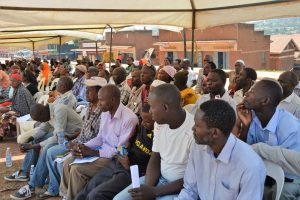
These problems were raised in meetings with both the district and municipal councils. They were formally submitted to the municipal council by CoST Uganda in its 2019 assurance letter of findings and recommendations.
What impact has this had?
The municipality of Makindye Sabagabo has now started to address the critical problem of waste disposal. On another of CoST Uganda’s recommendations, it has submitted a bylaw legislating how waste management systems need to function – namely, that citizens cannot simply dump waste they create. As of late 2019, the bylaw is currently with the Solicitor General and is under review. The municipality has started to work alongside private waste disposal companies and has begun preparations for a municipal waste disposal system.
Crucially, it has started to work with communities to improve waste and sanitation practices which will mean that change occurs from the bottom – up. Makindye-Sagabago now holds monthly community clean ups which have been driven by the community itself.
Again in this instance, CoST has played an important role in supporting and advising on how public participation can encourage better infrastructure delivery. As Joseph Kimbowa, the Town Clerk says:
‘’CoST had a really positive impact on the community involvement in this issue. In terms of planning and evaluating projects we now know to involve communities and update them on progress as much as possible. People have committed to giving parts of their (already small) plots to widen roads so garbage trucks can access them.’’
Joining up approaches: taking lessons from Wakiso District across the African continent
These stories from Wakiso District demonstrate the impact of the CoST approach. By using barazas as a platform for information sharing, residents have had opportunities to raise pressing concerns about truly life changing issues. Now, we are seeing this activity replicated by other CoST members across the continent. CoST Malawi has instigated a series of community meetings which have incorporated the baraza format and have been supported by its traditional and successful use of local radio to engage citizens. CoST Sekondi-Takoradi, Ghana held its first baraza in mid-2019 and CoST Tanzania is in the process of taking forward a similar approach. In the true spirit of CoST, each member is not simply adopting the approach but adapting it to the needs of the country in question.
Download the Wakiso District impact story here.